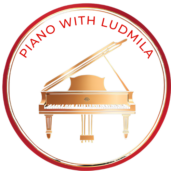Piano Qualification
"Everyone can be piano qualified!"
After about a year of learning and playing piano with me (#pianowithludmila), I offer all my students the opportunity to take their playing to the next level by beginning their journey toward a piano qualification (Grades 1–8).
This path opens the door to exploring a wide range of musical styles through graded piano pieces—moving from classical works to jazz, country, blues, and more. Students not only grow musically through playing and practicing these pieces, but also develop resilience as they take on the increasing challenges that come with progressing through the grades.
Working toward a qualification is a big commitment for both students and parents. It requires determination, regular practice, encouragement, and sometimes a gentle push at just the right moment.
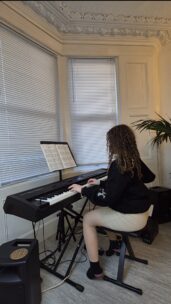
Piano qualification
Piano Practical Grades. Initial Grade and Grades 1 to 8. Piano Practical Grades are accredited face-to-face/digital exams. They focus on all-round musical knowledge and skills, including performance. In the exam you perform three pieces, play scales and arpeggios and take sight-reading and aural tests. Alternatively, you perform four pieces as a digital exams recorded on any devices and sent to the board.
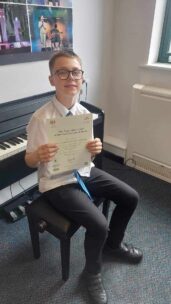
Piano Qualifications: Types & Levels
There are several piano qualifications available depending on your goals, skill level, and musical interests. These qualifications range from beginner levels to professional diplomas.

Graded exams are the most common form of piano qualification. These typically go from Grade 1 (beginner) to Grade 8 (advanced). The main exam boards offering graded piano exams are:










Diplomas are advanced qualifications for those looking to become professional performers, teachers, or musicians.

ARSM (ABRSM) – A performance-only diploma (no technical or aural tests).
DipABRSM, LRSM, FRSM (ABRSM) – Higher-level diplomas for professional pianists.
ATCL, LTCL, FTCL (Trinity College London) – Equivalent to different levels of university degrees.
DipABRSM in Teaching – For those wanting to teach piano professionally.
DipLCM, ALCM, LLCM in Teaching – Offered by LCM for piano educators.

For serious pianists, universities and conservatories offer:




For beginners & hobbyists → Graded exams (ABRSM, Trinity, LCM)
For aspiring professionals → Grade 8 + Diploma (DipABRSM, ATCL, etc.)
For performers → Performance Diplomas (ARSM, LRSM, FTCL)
For teachers → Teaching Diplomas (DipABRSM Teaching, DipLCM Teaching)
For university-level education → BMus, MMus, DMA
Would you like help choosing a specific qualification for your goals?
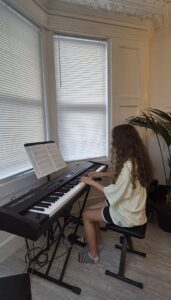
Why Choose a Piano Qualification?
Pursuing a piano qualification can be beneficial for various reasons, depending on your goals. Here are some key reasons why you might consider getting one:

Structured Learning: A qualification ensures you follow a structured curriculum, covering technique, theory, and repertoire.
Skill Validation: It helps you track progress and achieve milestones in your playing.
Discipline & Commitment: Preparing for exams teaches dedication, practice habits, and resilience.

Teaching Credentials: Many music schools and private students prefer teachers with recognized qualifications (e.g., ABRSM, Trinity, RCM).
Performance Opportunities: Advanced certifications open doors to competitions, concerts, and professional gigs.
University Admissions: Some institutions consider music qualifications as an asset for scholarships or general admission.

Official Certification: Having a diploma or grade certificate boosts confidence and credibility.
Motivation & Achievement: Completing exams gives a sense of accomplishment and motivation to improve further.

Music Theory & Aural Skills: Exams often include theory and ear training, essential for becoming a well-rounded musician.
Exposure to Various Styles: Piano qualifications require playing pieces from different eras and styles, enriching musical understanding.
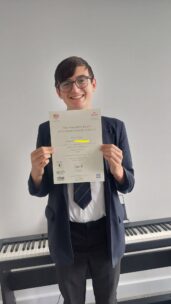
The right piano qualification for you...



Globally recognized and highly respected
Strong focus on sight-reading, aural skills, and technique
Clear graded system (Grades 1-8) + Diplomas (ARSM, DipABRSM, LRSM, FRSM)
No flexibility in exam pieces (strict syllabus)
Aural tests can be challenging for some students
To find out more about ABRSM piano qualification



More freedom in choosing exam pieces
No sight-reading or aural tests required for some levels
Also offers Rock & Pop piano exams
Less focus on classical technique compared to ABRSM
Slightly less recognized than ABRSM for academic purposes



Wide range of exams: Piano, Jazz, Contemporary, and Leisure Play
Focus on both performance & theoretical knowledge
Offers diplomas like DipLCM, ALCM, LLCM, FLCM
Less globally recognized than ABRSM or Trinity
Some exams require written work in addition to performance



Ideal for modern piano styles (Pop, Jazz, Blues, Film Music, etc.)
Focus on improvisation, music production, and digital music
Not as strong for classical piano
Limited use for traditional music college admissions

If you want to go beyond Grade 8, you can pursue diplomas:
ABRSM: ARSM, DipABRSM, LRSM, FRSM
Trinity: ATCL, LTCL, FTCL
LCM: DipLCM, ALCM, LLCM, FLCM
RSL: Professional Diplomas
Which one should You choose?

For Classical Pianists → ABRSM or Trinity
For Flexible Learning & Repertoire Choice → Trinity or LCM
For Jazz & Contemporary Styles → Rockschool or LCM Jazz
For Formal Teaching & University Recognition → ABRSM or Trinity Diplomas
For Fun & Leisure (without pressure) → LCM Leisure Play
Would you like help deciding which one suits your goals best? 
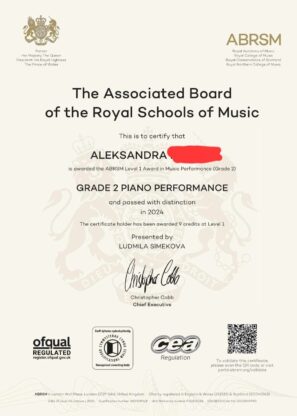
Best Exam Boards for Beginners
Most music exam boards offer structured graded exams, starting from Pre-Grade 1 (Initial Grade) to Grade 1. These are ideal for beginners and provide a strong foundation.


Starts from Initial Grade (optional) and then Grade 1.
Focuses on classical piano, sight-reading, scales, and aural skills.
Highly respected worldwide.
Example beginner piece: Bach – Minuet in G.
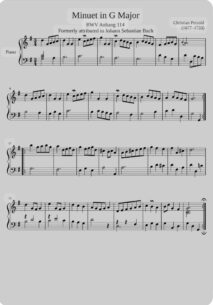

Offers Initial Grade before Grade 1.
More flexibility in choosing pieces compared to ABRSM.
No aural tests for some levels.

Has a Step 1 & Step 2 level before Grade 1.
Includes Leisure Play exams for casual learners.
Good balance of classical and modern styles.

Perfect for pop, jazz, and modern piano styles.
Includes chords, improvisation, and rhythm-focused exercises.
Example beginner piece: Coldplay – Clocks.

If you just want to play for fun and avoid technical tests, some exam boards offer performance-only options:

